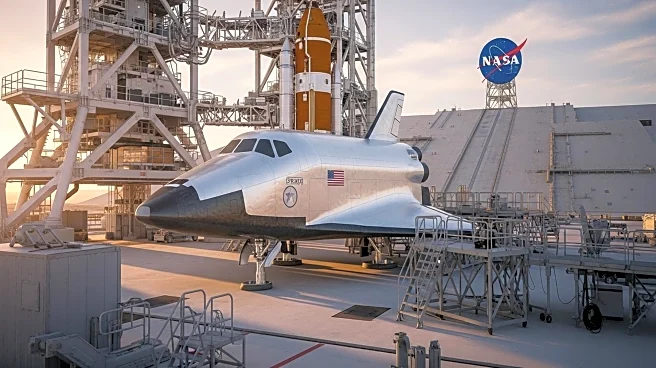What's Happening?
NASA's twin ESCAPADE spacecraft have returned to Florida in preparation for their upcoming launch to Mars. These spacecraft are designed to study the Martian magnetic field and its interaction with space weather, which influences the planet's atmospheric escape. The ESCAPADE mission aims to provide valuable data to protect future human and robotic missions to Mars. The spacecraft were previously in Florida in 2024 but returned to California after a launch attempt was postponed. They are now at the Astrotech Space Operations Facility in Titusville, Florida, where Rocket Lab engineers will conduct inspections and functional tests before propellant loading and vehicle integration. The launch is scheduled to occur no earlier than this fall on Blue Origin's New Glenn rocket.
Why It's Important?
The ESCAPADE mission is significant as it will enhance our understanding of Mars' magnetic field and atmospheric dynamics, which are crucial for planning future missions to the Red Planet. By studying these interactions, scientists can develop strategies to mitigate risks for both human and robotic explorers. The mission is part of NASA's Small Innovative Missions for Planetary Exploration program, highlighting the agency's commitment to advancing space exploration through innovative partnerships. The data collected will contribute to the broader scientific community's efforts to understand planetary atmospheres and space weather phenomena, potentially influencing future exploration strategies and technologies.
What's Next?
Following the completion of inspections and tests, the ESCAPADE spacecraft will undergo propellant loading and vehicle integration. The launch, scheduled for this fall, will be conducted using Blue Origin's New Glenn rocket. Once in orbit around Mars, the spacecraft will begin their scientific mission, collecting data on the Martian magnetic field and atmospheric escape processes. The findings from this mission could inform future Mars exploration missions, including those involving human presence, by providing insights into the planet's environmental conditions and potential hazards.
Beyond the Headlines
The ESCAPADE mission represents a collaborative effort involving multiple institutions, including the University of California, Berkeley's Space Sciences Laboratory, Rocket Lab, NASA's Goddard Space Flight Center, Embry Riddle Aeronautical University, and Advanced Space LLC. This partnership underscores the importance of cross-institutional collaboration in advancing space exploration. Additionally, the mission's focus on Mars' magnetic field and atmospheric dynamics may have implications for understanding similar processes on other planets, contributing to the broader field of planetary science.









